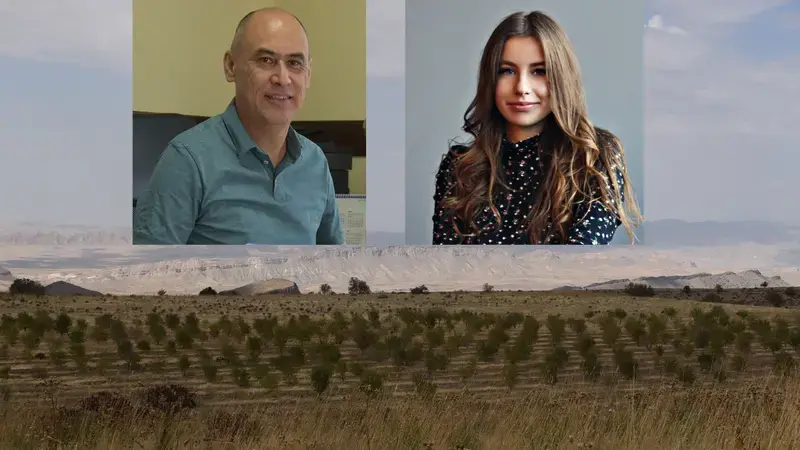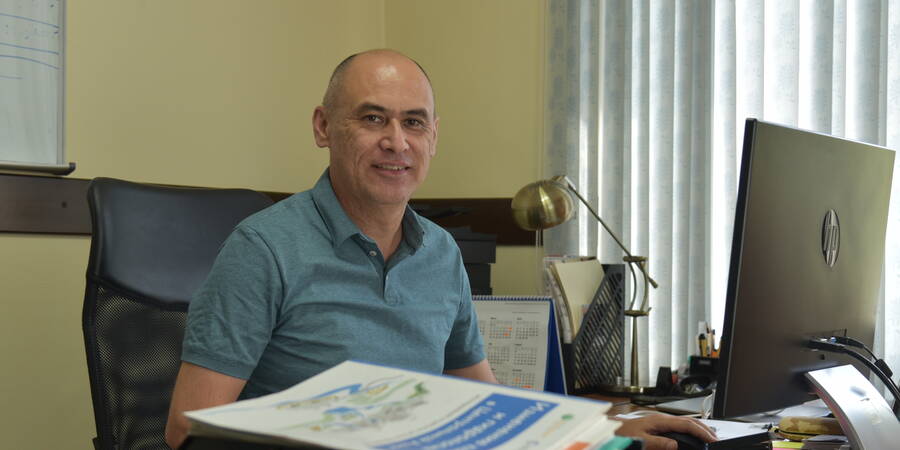In Tumultuous Times, Inspiring the Next Generation of Scientists

“Young people are on the frontlines of the struggle to build a better future for all,” said UN Secretary-General António Guterres, in the lead up to International Youth Day.
Today we examine our important agricultural academic capacity-building activities through two distinct, yet harmonious voices: that of a senior ICARDA scientist, and that of the master's student he supervised during the pandemic outbreak.
Dr. Akmal Akramkhanov is a senior scientist and a sustainable land management expert. Based in Tashkent, Uzbekistan, he works at ICARDA’s Central Asia and Caucasus office.
He co-supervised Bonn University master’s student Anastasiya Shyrokaya, who leveraged her background in economics and environmental science to evaluate the impact of Uzbekistan’s ongoing land degradation.
In this blog, Dr. Akmal and Anastasiya’s voices echo the merits of this collaboration, the importance of young voices, why it makes sense to capitalize on academia, and practical experiences in knowledge sharing.
Hearing both points of view show that in unprecedented times, flexibility is essential to pursue science.

Dr. Akmal Akramkhanov
It is especially important, within a scientific organization, to create an environment that fosters continuity. To get there, you must build up new capacities.
As research centers across the world move towards project-based models, with projects lasting two to three years on average, it has become increasingly difficult to attract the young and ambitious researchers that science needs.
To overcome this challenge and involve young blood in our work, ICARDA teams up with global academic institutions and students at the Master’s, PhD, and Post-Doc levels. We try, as much as possible, to connect with local and foreign universities and institutes to mentor young scientists in our field.
When a former colleague at Bonn University, where I studied for my PhD, recommended that I co-supervise Anastasiya’s Master’s Thesis, I was keen to learn more about her research idea on land degradation in Uzbekistan.
Once we established her main research objectives and discussed the potential difficulties related to time limitations and data collection, the plan was for her to come to Uzbekistan and see the ground conditions for herself.
We realized fairly quickly that the pandemic was going to considerably alter our research plan. She was stuck in Bonn, and our entire scientific collaboration had to occur virtually, behind screens. We adjusted to the new reality and were able to continue our research work in good conditions.
And while she was understandably disappointed not to be here, experience has taught me that groundwork alone does not in it and of itself lead to a full grasp of a place’s context and environment, contrary to what many scientists and students come to expect.
To help Anastasiya immerse herself into the study topic, I tried to guide her, and help contextualize her findings. I also compared open-source data with the reality on the ground.
Having Anastasiya with us also gave us a new point of view. Her background in economics was very helpful to put a price tag on the ongoing land degradation in Uzbekistan. Quantifying the amount of money that’s lost in ecosystem services is very striking and will help us raise awareness across the board.
You must read the study to know more!

Anastasiya Shyrokaya
My supervisor at Bonn University used to work at ICARDA, and recommended I approach Dr. Akmal, who is an experienced researcher, for my thesis on land degradation.
After Dr. Akmal and I spoke and discussed the various research objectives and the type of data I was going to need, he agreed to co-supervise my thesis.
The best part about working with him was his deep knowledge of the country context.
In May last year, we discussed the fact that I may not be able to travel to Uzbekistan. At the time, the country remained largely untouched by COVID, but we knew this could change rapidly. He helped me prepare for that scenario by clearly laying out the diverse ways in which I could adapt to these unfortunate circumstances, work remotely and access data online.
Some local data is not openly accessible on the internet, and I remember contacting him after failing to find maps I desperately needed for my work. Without a blink, Dr. Akmal peeled these maps off his office walls, scanned them and sent them to me.
Throughout, I really felt like he was taking my hand and leading me, which gave me a lot of confidence as to the quality of the work we were producing.
In addition, the fact that he specializes in sustainable land management meant that I had the chance to understand the reality of the field, rather than just the theory. I’m very glad that through our research collaboration, we uncovered new evidence that will be useful to him in the future.
Of course, I would have loved to be physically there, especially since my mother was born in Uzbekistan. I grew up eating traditional Uzbek food, and listening to local fairytales, so I had a strong sense of the culture without ever visiting. But I am hoping to go there at some point, to conduct additional interviews for my research.
I am now about to start a PhD program, and I know that my experience with ICARDA made a strong impression on the jury.
In fact, I am fairly sure that this experience is what tipped the balance in my favor and got me enrolled, so I am beyond grateful to Dr. Akmal and ICARDA.
My PhD research is on drought forecasting, in the context of Europe for the time being. I hope to collaborate with ICARDA again in the future.
For a summary of their important findings on land degradation in Uzbekistan, click here
ICARDA is grateful to the Deutsche Gesellschaft für Internationale Zusammenarbeit (GIZ), The Council for Tropical and Subtropical Agricultural Research (ATSAF), and the University of Bonn for making this study possible.

